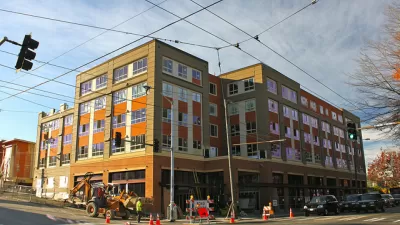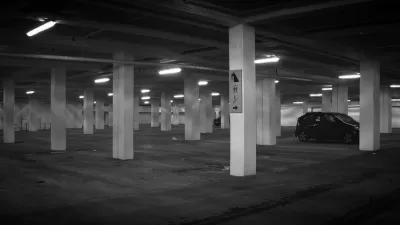Though housing advocates consider micro-housing units a helpful tool in keeping housing affordable, the city of Seattle has nonetheless produced a series of regulations making such projects harder and harder to build.
Architect David Neiman writes: "Taking stock and looking back over that last couple years, I think I’m ready to call it: The war against micro-housing is over…and micro-housing has lost."
Neiman is admittedly self-interested in the proliferation of micro-housing. His firm Neiman Taber has a business practice he describes as "deeply involved in micro-housing – as architects, as developers, and as proponents in the public policy sphere."
Nonetheless, Neiman reports that regulations pertaining to micro-housing in Seattle have finally procuded the "straw that broke the camel's back." Namely, "a recent SDCI director’s rule [pdf] that places new restrictions on Small Efficiency Dwelling Units (SEDU’s) to the extent that that they will no longer be meaningfully smaller than a typical studio apartment."
Before this last straw, however, came "a series of unforced errors that has taken Seattle from being a national leader on this issue to leaving the stage altogether," according to Neiman, who then provides a timeline of how the city killed micro-housing, starting in 2009, when examples first starting appearing in the Seattle housing market, provoking public "outrage."
hat tip to Josh Feit for sharing Neiman's blog post, along with a few other relevant, Seattle-area stories.
FULL STORY: The War Against Micro-housing is Over. Micro-housing Lost.

Maui's Vacation Rental Debate Turns Ugly
Verbal attacks, misinformation campaigns and fistfights plague a high-stakes debate to convert thousands of vacation rentals into long-term housing.

Planetizen Federal Action Tracker
A weekly monitor of how Trump’s orders and actions are impacting planners and planning in America.

Chicago’s Ghost Rails
Just beneath the surface of the modern city lie the remnants of its expansive early 20th-century streetcar system.

Bend, Oregon Zoning Reforms Prioritize Small-Scale Housing
The city altered its zoning code to allow multi-family housing and eliminated parking mandates citywide.

Amtrak Cutting Jobs, Funding to High-Speed Rail
The agency plans to cut 10 percent of its workforce and has confirmed it will not fund new high-speed rail projects.

LA Denies Basic Services to Unhoused Residents
The city has repeatedly failed to respond to requests for trash pickup at encampment sites, and eliminated a program that provided mobile showers and toilets.
Urban Design for Planners 1: Software Tools
This six-course series explores essential urban design concepts using open source software and equips planners with the tools they need to participate fully in the urban design process.
Planning for Universal Design
Learn the tools for implementing Universal Design in planning regulations.
planning NEXT
Appalachian Highlands Housing Partners
Mpact (founded as Rail~Volution)
City of Camden Redevelopment Agency
City of Astoria
City of Portland
City of Laramie





























